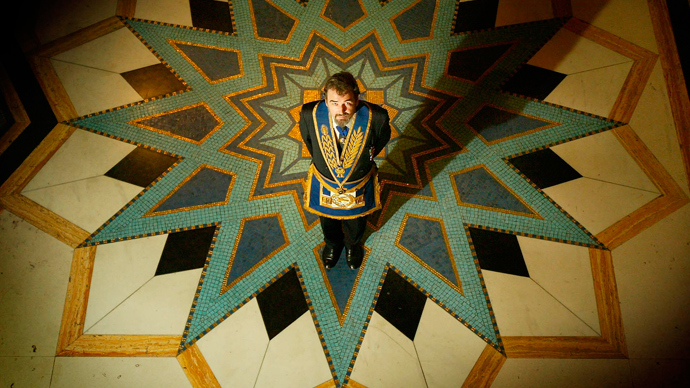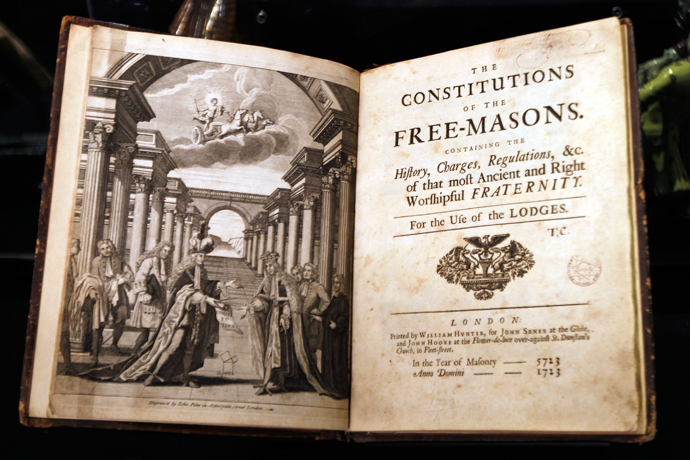This from RT
Freemasonry: 'The firm within the firm'

Last week brought more hard evidence of the latter (and darker), with the second leaked report from UK criminal justice authorities in as many years to conclude that mobsters use Freemasonry to freely recruit corrupt detectives, being one of 'the most difficult aspects of organized crime corruption to proof against.'
Scotland Yard's Operation Tiberius
report was written over a decade ago but has
only this week been made public by The Independent's
investigations editor, Tom Harper. It follows on from Project
Riverside, revealed by Channel 4 News' Andy Davies in March 2012
from the Serious Organized Crime Agency (SOCA), which also
describes Freemasonry in round terms as 'a firm within a firm'.
Incredible though it may seem, although paid for with public
money, both these reports have taken nearly a decade to surface,
and then only as partial press leaks.
So why did the authors of Scotland Yard's
Operation Tiberius' find Freemasons so difficult to winkle out?
Most know Freemasonry sits somewhere between a religious cult and
a pyramid selling scheme but have no idea where 'The Craft' came
from, or what makes Masons tick. It's the oath of secrecy,
similar to the Mafia's Omertà, on pain of death, which, in
theory, makes any revelation about ‘The Craft’ a slip of the
tongue you can die for.
Behind the lodge door
Masons have a pyramid of initiation through 33
ranks, or 'degrees' and belong to geographic 'Provinces' overseen
by London's United Grand Lodge of England (UGLE). They follow
civic county boundaries and each produce an annual yearbook with
a tally of lodges followed by members names in each lodge. One
would have thought it would be a relatively simple job,
therefore, for Scotland Yard detectives to figure out who of
their colleagues are in and who are out.
The trouble is those yearbooks are jealously
guarded. Masonic Bristol MP, Jack Lopresti, for example, promised
me a copy of the latest Bristol Yearbook live on the radio in
April 2012 but his provincial secretary, Steve Rawlings, refused
to send it. This begs the question: when a senior public figure
is low to middling in the secret Masonic hierarchy, who's really
in charge in the world of the 'profane', as Masons call the
public?
As a secret establishment club, Freemasonry
rightly rings alarm bells. By seizing only a handful of key
positions in the criminal justice system, like any unscrupulous
interest, it could corrupt the entire caboodle. The other
nerve-jangling concern is that Freemasonry's 'Don' just happens
to be a little too close to one the top figures in Britain's
military and judicial chain-of-command; UGLE's Grand Master,
Prince Michael of Kent, is Queen Elizabeth II's cousin.

Historians trace Masonic scandals back to a
few decades after 'The Craft' was founded in the eighteenth
century as a society of 'free thinkers'. The occasion was the
1798 publication of John Robison's 'Proofs of a Conspiracy
Against all the Religions and Governments of Europe'. When he
said proofs, proofs he meant. Quoting verified leaked documents,
he detailed methods of political infiltration and deception to be
used by a coterie of senior German masons, sponsored by a wealthy
ancestor of the present British royal family, Duke Ernest II of
Saxe-Gotha-Altenburg.
Quoting links to the perpetrators of the
bloody French Revolution, Robison's scandal flew like a whirlwind
round the high society of Europe. This exposé might have been
roundly discredited by Masonic loyalists as 'Conspiracy Theory'
had the author not been one of the most respected men of his day,
his brilliant scientific mind nurturing the white heat of
scientific innovation driving the industrial revolution.
Secretary of the Royal Society in Edinburgh,
Robison was a close friend of the inventor of the steam engine,
James Watt, and above all, from the point of view of credibility,
a Freemason himself. He saw the secrecy which had protected
free-thinking innovators beginning to take on a new self-serving
character absolutely contemptuous of outsiders. Along with the
1798 'Memoirs Illustrating the History of Jacobinism' by Abbé
Augustin Barruel in France, Robison's forensic critique of
Freemasonry caused a bitter public schism in ‘The Craft’ which
lasted a decade or more, before being 'buried alive' with the
passing of Robison's generation.
So Masonic scandal is nothing new. Every time,
whether the 'powers that be' hit Masonic accountability into the
long grass or not, the true remedy is the same: declare your
secret society membership as an interest like any other or face
prosecution for misconduct, particularly in public office. One
would expect to find those principles as the nucleus of all
probity and good governance for associations and corporations
round the world, both public and private, yet they are eerily
absent.
Is Freemasonry a fundamentalist religious cult?

Though many accuse 'The Craft' of being a
religious cult, Freemasonry may not fit the definition of a
'religion' in the usual sense. However, Masons certainly hold
strong beliefs about Western influences in the Holy Land. Those
of the higher degrees privately profess a 'fundamentalist' fervor
for Zionism. Israel's own Grand Lodge was founded in 1953, now
numbering between 50 and 60 lodges with thousands of members.
Indeed even in Bristol's windowless 'Royal Arch' Masonic Temple,
the furnishings are embossed throughout with golden Israeli 'Star
of David' emblems.
Where you can find them, former Freemasons
give dazzling insights into the favors ‘The Craft’ affords as
well as the evils of what is essentially a 'gang for grown ups'
strewn through with a toxic mix of mumbo-jumbo and bullying. Both
Stephen Knight's 1984 book 'The Brotherhood' and former 'World In
Action' journalist Martin Short's 1989 follow up 'Inside The
Brotherhood' do an ample job documenting the testimony of those
brave enough to reject the threats and leave ‘The Craft’. The
latter, as a six-part Granada TV documentary, found its way to an
incredulous national audience the same year.
TV examinations are notoriously few and far
between, but in his 1999 HTV Documentary 'Rites and Wrongs'
journalist James Garrett discovered a human skull and two femur
cross bones hidden away in a chequered cabinet. He asked
Gloucestershire's top Mason on camera, "What part do the skull
and cross bones play in your ritual?" Provincial Grand Master
Peter Marsh's voice quavered as he replied "Well, yes there are
some skulls and cross bones which are part of the regalia of the
lodge and they represent mortality." Perfect for emphasizing that
threat of death then, Peter?
The Church of England and House of Commons deliberate
In 1987, the General Synod of the Church of
England considered the question 'Freemasonry and Christianity:
Are they compatible?' Failing to come down on one side or the
other of the fence they concluded, "The reflections of the
working group itself reveal understandable differences of opinion
between those who are Freemasons and those who are not." So
despite a clear instruction from Jesus Christ in Matthew 5:37
"Never swear an oath, simply let your 'yes' be 'yes' and your
'no' be 'no', anything else comes from the devil," they Church of
England couldn't make their minds up.
In 1998 Labour MP, Chris Mullin, chaired the
second House of Commons Home Affairs Select Committee Enquiry
into Freemasonry in as many years. The report's penultimate
paragraph "requires public servants who are members of a secret
society ... to disclose their membership." The result was
non-compliance by many of Britain's police forces. The Standards
Board for England which, for several years required all elected
local councilors to declare membership of secret societies was
conveniently abolished by the Lib/Con coalition government in
2012 as part of their deregulation policy.
Even if Freemasonry does not control some of
the key positions of state in its own self-interest, its
involvement in promoting its own to positions of power and
privilege is a likely candidate to explain why Britain is
increasingly being controlled by individuals who seem entirely
unsuited to positions of public trust.
If ‘The Craft’ has not yet become a kind of
secret government, as a 1981-84 Italian parliamentary enquiry
proved Propaganda Due (P2) Masonic Lodge to be, it is almost
certainly why Britain is paralyzed by what's known in drinking
dens across the land as the 'Tyranny of the Mediocre'.
So as thin old London police and newsroom
files on Freemasonry start to fill up with cold hard truths, at
the very least it should concentrate the minds of those thinking
of using Freemasonry as a convenient cover for crookedness. It is
only a matter of time now before their secret number is
up.
The
statements, views and opinions expressed in this column are solely those
of the author and do not necessarily represent those of RT.


No comments:
Post a Comment